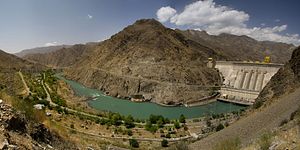It’s perhaps telling that there’s no mention of the landmark Central Asia-South Asia Electricity Transmission and Trade project, commonly known as CASA-1000, in Rustam Qobil’s recent piece for the BBC on water and electricity woes in Central Asia.
In fact, it seems the only source mentioning the project of late is Pakistan. Earlier this month a Pakistani official from the water and power ministry, Muhammad Younus Dagha, invited Russia to join the CASA project. More specifically, Pakistan and Russia were said to have begun negotiations on a 600 MW gas-fired power plant.
The Tribune quoted Dagha as saying work on CASA-1000 had already begun and outlining how Russia could factor into the regional energy market: “Kyrgyzstan and Tajikistan will transmit their hydel (sic) electricity through the transmission line to Pakistan during the summer months; May till October. However, from October till April, the line will be available to transmit Russian thermal energy.”
The CASA-1000 project, inaugurated last May in Tajikistan, envisions Kyrgyzstan and Tajikistan supplying electricity generated by hydropower to energy-starved South Asia.
The World Bank billed the project as a major first step “realizing the potential for energy trade between Central Asia and South Asia.” The World Bank also noted that the revenues from selling electricity to Afghanistan and Pakistan would then be “used to alleviate acute winter energy shortages.”
Qobil’s BBC article explains Central Asia’s winter electricity shortages more expansively, linking those shortages to regional politics in the aftermath of the Soviet Union’s breakup:
Three republics — Kazakhstan, Uzbekistan and Turkmenistan — were rich in energy resources, while the other two — Tajikistan and Kyrgyzstan — had plentiful water supplies held in huge high-altitude reservoirs. They all had to work together to ensure there was water for the crops in the spring and summer, and electricity for everyone in the winter.
But as the upstream countries invested in more dams to generate more electricity, meaning less water was released downstream. And the energy-rich regional states realized they could make more money selling to foreign states in place of Kyrgyzstan and Tajikistan.
Winter shortages have become more acute in Tajikistan in particular, leading the state to double down on becoming an energy exporter. The massive Rogun dam looks to be moving ahead. EurasiaNet reported earlier this week that Tajik officials say work will begin soon on stemming the flow of the Vakhsh river to allow for construction.
Uzbekistan’s recently departed President Islam Karimov infamously warned in 2012 that dams upriver could lead to “regional confrontation and even war.” On a local level, arguments over canals, reservoirs, and irrigation have led to stone-throwing in border villages and added stress along stretches of the Fergana valley that are still in dispute.
But there may be no better time for Central Asia’s mountainous states to capitalize on their hydropower potential. In early September at a conference hosted by the OSCE Academy in Bishkek (under Chatham House rules), one speaker suggested that Central Asian states ought to focus on hydropower projects sooner rather than later. All else aside, the fact is that in 20 or 30 years river water flow is expected to decrease by 30 percent due to the effects of climate change. Climate change, the speaker noted, has made glacial melt rates rise in recent years and Kyrgyzstan and Tajikistan ought to seize the moment literally rushing by.
The Rogun dam, if completed, will certainly solve Tajikistan’s winter energy shortage and may feed sales to South Asia. The international financial institutions funding the CASA project by default prefer to avoid political issues, but it’s the politics that will damn the project (and the fact that Afghanistan is still a war zone.) Exactly how Uzbekistan responds to Tajikistan’s determination to see Rogun through, is crucial — will Karimov’s warning one day become a reality?
































